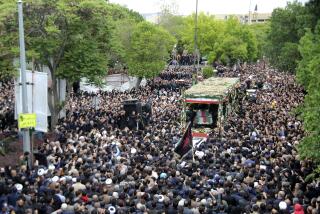Offer Sympathy and Regret : Americans Respond to Iran Airliner Tragedy
- Share via
NEW YORK — “It was a horrible, senseless thing to happen. . . . Please accept my apology and my heartfelt sorrow. . . . I share your grief and outrage. . . . May God be with you.”
Such are the sentiments of Americans in letters to families of the 290 people killed July 3 when the U.S.S. Vincennes mistakenly shot down an Iranian airliner over the Persian Gulf.
“Our crying extends across the oceans,” wrote Ginger Smith of Honolulu.
The U.S. outpouring was typically grass roots, initiated unofficially, reflecting varied emotions and attitudes, but overwhelmingly expressing sympathy and regret.
“My heart goes out to you in your loss of a loved one,” wrote Virla Jean Lynk of Saginaw, Mich. Maria Keeling of Norman, Okla., wrote: “I wish I were there to hold your hand during your sorrow.”
‘Don’t Hate’ the U.S.
Lauri Jo Pietila of San Francisco wrote: “I grieve for all of you and the terrible injustice that has been done. Please don’t hate the entire United States. . . .”
Many of the letters spoke of the common humanity of all people, whatever their nations or conflicts between them.
“We are brothers and sisters,” wrote Michele Gallery of Studio City, Calif. Paul J. Piccard of Tallahassee, Fla., wrote: “Since we all share the same humanity, it is also my loss.”
The project was begun by the Rev. W. Canty, a New York Episcopal priest, who says “some of the letters have caused me to weep. The love and compassion expressed by Americans for people half a world away is quite extraordinary.”
Once the collection is accumulated, he plans to have the letters translated into Iran’s language, Farsi, and the languages of other victims, and bound. He then plans to deliver them personally to the bereaved families.
Several mainline denominations have endorsed the project, as has Father Lawrence M. Jenco, a Roman Catholic priest held hostage in Lebanon for 19 months before his release in mid-1986.
“I hope that you will accept the love in my heart,” wrote Brent Haug of Las Vegas, Nev. He said a best friend in college was an Iranian and wished “all of us could have the benefit of meeting each other on friendly terms.”
‘Think About You Humanely’
A New York Jew, Brynna C. Bloomfield, wrote that she formerly regarded non-Jewish Middle Easterners as an impersonal “mass,” but the accident has caused her “to think about you, humanely, for the very first time.”
“Your losses . . . have caused me to . . . see . . . husbands and mothers and sisters and children. Then, I think you must love and despair as I do.”
Andrew Cohen, a Houston student, wrote that “my government and your government are enemies, but every man’s life is equally important. All people are the same. . . . I’ll be thinking of you and your pain. God bless you.”
Only about 100 letters have been received so far, but they’re still coming, mainly from ordinary people but also from members of Congress, judges, mayors, governors, ministers and movie actors.
A few letters criticized U.S. policy, but most avoided assessing blame. The Pentagon attributed the accident to stress and “human errors” in reading data. Only two letters denounced Iranians and also the project.
Canty said that gathering the letters was non-political. “All people are victims of this accidental tragedy in one way or another. Empathizing with grief and sharing these condolences allows the healing process to start.”
Some Voice Shame
Some letters voiced shame at the incident. “I love my country, but at this time I feel great sorrow and shame for the terrible horror it has caused you,” wrote Lucile Sealander of Fayetteville, Ark.
Some letters came from parents who had lost loved ones in American airplane crashes. A New York woman, Lois Spark, whose son died in an 1986 crash in Detroit that killed 157, wrote:
“I know your anger and feel your pain along with mine. . . . My hope for us, as survivors of these victims, is that they did not die in vain. That out of this tragedy will come a new desire to live together on this Earth in peace.”
More to Read
Sign up for Essential California
The most important California stories and recommendations in your inbox every morning.
You may occasionally receive promotional content from the Los Angeles Times.












